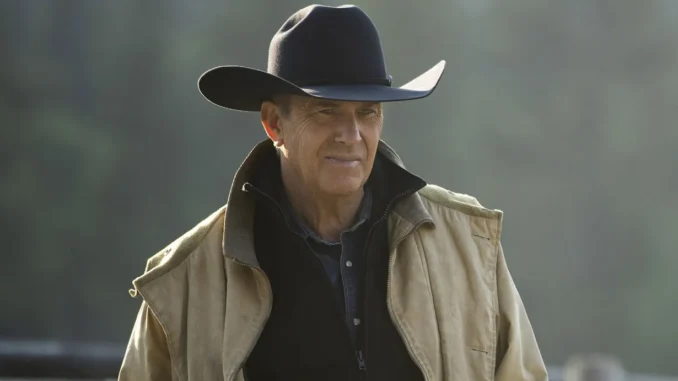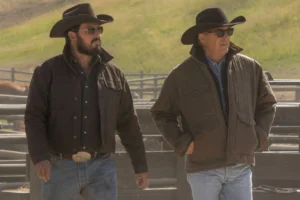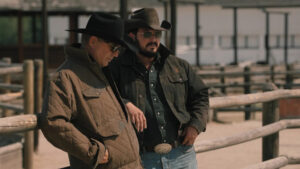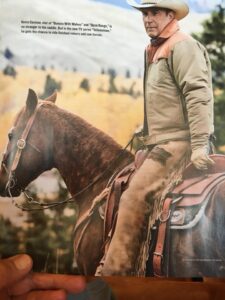
Behind the Scenes of the ‘Yellowstone’ Finale: Director Reveals the Truth About John Dutton’s Fate
The Yellowstone series finale marked the conclusion of one of television’s most gripping and epic neo-Westerns. With its intricate storylines, layered characters, and stunning cinematography, the show had captivated audiences for years. The finale, however, left viewers with more questions than answers, especially regarding the fate of the iconic patriarch, John Dutton. In a recent interview, the episode’s director provided much-needed clarity, including the mystery of how John ended up in the coffin seen in the show’s closing moments.
A Shocking Twist in the Finale

Throughout the final season, tension between the Dutton family members reached a boiling point. The feud between Beth (Kelly Reilly) and Jamie (Wes Bentley) escalated, threatening to tear the family apart. Meanwhile, Kayce (Luke Grimes) grappled with his role within the Dutton legacy and his family’s survival amidst the chaos surrounding the Yellowstone ranch.
The finale shocked viewers with a series of unexpected twists. The biggest revelation was the final scene featuring John Dutton’s (Kevin Costner) coffin, a moment that left fans speculating about how and when the powerful patriarch met his end. For many, the finale was as heartbreaking as it was mysterious, raising questions about the decisions leading up to the ranch’s fate.
The Director’s Insight: John’s Final Chapter
In an exclusive interview, the finale director shed light on the creative choices behind John Dutton’s storyline. According to the director, John’s death was a symbolic culmination of his character’s journey, which had always been defined by sacrifice, loyalty to the land, and a deep sense of duty to his family.
“John Dutton has always been the heart and soul of Yellowstone Ranch,” the director explained. “But we wanted to explore what happens when that heart is no longer beating. His death wasn’t just about the man—it was about the legacy he left behind and the chaos his absence creates.”

The coffin scene, which many interpreted as a straightforward death reveal, was intentionally crafted to leave room for interpretation. “We wanted to keep the audience guessing, to make them reflect on John’s choices and how they impacted everyone around him,” the director added. “It’s not just about how he died, but why.”
The Feud That Defined the Family
The finale also explored the devastating consequences of the Dutton siblings’ rivalry. Beth’s vendetta against Jamie reached a critical point, with both characters making moves that threatened to destroy the other. The director emphasized that this sibling conflict was central to the finale’s narrative.
“Beth and Jamie’s relationship has always been volatile, but in the finale, we see how their hatred for each other overshadows everything else,” the director noted. “John’s death serves as the catalyst for the final showdown between them, forcing both to confront what they truly want.”
Beth, who has long blamed Jamie for her trauma, finds herself at a crossroads. Her father’s death leaves her questioning her priorities and whether revenge is worth the cost. Meanwhile, Jamie, desperate to escape Beth’s wrath and reclaim his own sense of identity, makes a bold move that changes the family dynamic forever.
Kayce’s Struggle: The Weight of the Legacy

While Beth and Jamie’s feud dominates much of the finale, Kayce’s storyline provides a more introspective counterpoint. As the only Dutton son still loyal to the ranch, Kayce faces the impossible task of preserving his father’s legacy while protecting his own family.
“Kayce is the character who truly understands the cost of being a Dutton,” the director shared. “He’s torn between his love for his father and his desire to forge his own path. The finale highlights that internal struggle and sets the stage for what comes next.”
Kayce’s scenes in the finale underscore his role as the moral center of the Dutton family. Unlike his siblings, he is driven by love and duty rather than power or revenge. This makes him the natural heir to the Yellowstone ranch, but also the most tragic figure, as he must bear the weight of his family’s legacy alone.
The Symbolism of John Dutton’s Coffin
The image of John Dutton’s coffin is one of the most haunting moments of the finale. The director revealed that this scene was carefully crafted to symbolize not just John’s death, but the end of an era for the Yellowstone ranch.
“The coffin represents more than just John—it represents the death of the old way of life on the ranch,” the director explained. “It’s a visual metaphor for the sacrifices made to protect the land, and the ultimate price John paid for his principles.”
The scene also serves as a stark reminder of the show’s overarching theme: the battle between tradition and progress. With John gone, the future of the ranch hangs in the balance, and the remaining Duttons must decide whether to honor his legacy or carve out a new path.
What’s Next for the Yellowstone Universe?
Although the main storyline of Yellowstone has come to an end, the franchise is far from over. The director hinted at potential spin-offs and continuations that will explore the broader universe created by Taylor Sheridan.
“There’s so much more to this world than just the Dutton family,” the director teased. “We’re excited to dive deeper into the history of the ranch, the characters who came before, and the challenges that lie ahead.”
One confirmed project is the continuation of 1923, which chronicles the early days of the Dutton family and provides context for the events of Yellowstone. Fans can also look forward to the spin-off 6666, which focuses on the famous Four Sixes Ranch in Texas. These projects promise to expand the Yellowstone universe while providing answers to lingering questions from the original series.
The Legacy of ‘Yellowstone’
As the dust settles on the Yellowstone finale, one thing is clear: the show’s impact on television is undeniable. From its stunning cinematography to its complex characters and compelling storylines, Yellowstone has set a new standard for the modern Western genre.
The finale, while bittersweet, serves as a fitting conclusion to John Dutton’s story and a testament to the show’s themes of family, loyalty, and sacrifice. And though the main series has ended, the Yellowstone universe continues to thrive, ensuring that the Dutton legacy lives on.
In the words of the director, “John Dutton may be gone, but his spirit will always be a part of Yellowstone. This is just the end of one chapter—and the beginning of many more.”
